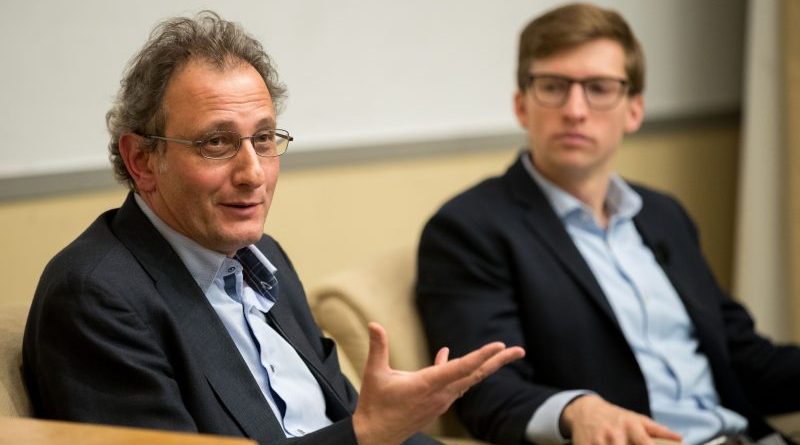Fletcher Russia and Eurasia Program Hosts Launch Event with Andrei Kolesnikov
The Fletcher School recently celebrated the launch of its new Russia and Eurasia Program with an event featuring Russian journalist and author Andrei Kolesnikov. In a conversation with Chris Miller, Assistant Professor of International History at The Fletcher School, Kolesnikov provided an astute long-time observer’s view on Russian domestic politics. Given the heightened tensions between the United States and Russia and the Russian election scheduled to take place in only five weeks, the event offered the Fletcher community a unique insider’s perspective on the often-opaque dynamics of Russian domestic politics in the era of President Vladimir Putin.
As Miller pointed out early in the conversation, one of the central dilemmas in contemporary Russian politics revolves around two widely observed trends that seem to be in tension with one another: a populist desire to see new faces in politics, on the one hand, and a rise in illiberalism, on the other. Both trends are widely observed beyond Russia and indeed are sometimes attributed to Russian influence. How, then, can such apparently contradictory currents appear in the same political community?
The answer, Kolesnikov suggested, might have something to do with popular indifference. Even if there is widespread and genuine interest in seeing new actors on the political stage, his research indicates that some 60 percent of Russians “do not know” who can or will bring change, while an additional 25 percent believe that Putin himself is a reformer. “Right now,” said Kolesnikov, “there are a lot of indifferent people who are willing to adapt” to the current government — and thereby provide a significant measure of tacit support for it.
This “new wave” of populism does not line up with traditional left–right political divisions, Kolesnikov noted. He went on to point out the ironic convergence between some of the populists and the Putin regime that may account for some of the indifference toward the government. The Russian president’s “sincere desire was to become the leader of a new world order after current world disorder,” Kolesnikov told the crowd, but many Russian people were also happy to be seen as a leading world power again. Whatever they might feel about the “world disorder” of the moment, some of these people seem willing to put up with Putin, as he has had success in making Russia relevant on the world stage once again.
Of Russia’s relevance in contemporary world affairs there is no doubt — though the precise nature of its influence remains hotly contested on both sides of the Atlantic. As the U.S.-Russia relationship and the broader web of transatlantic relationships become increasingly important to the study and practice of diplomacy, the Russia and Eurasia Program at The Fletcher School will continue to convene incisive conversations around this pivotal and poorly-understood region.
In addition to research, teaching, and dialogue, the program will also provide Fletcher students with unique opportunities and resources to study and come to know these places and people for themselves. “We are excited to be to launching our Russia and Eurasia Program at a time when understanding the region is more important than ever,” Miller said, “Many Fletcher students have deep interests or connections with these countries, and we are looking forward to supporting them via research, guest speakers, exchanges, and study trips.”
While it is impossible to say, for certain, how populism and illiberalism will evolve in Russia in the coming years, Fletcher students will be better prepared to understand Russia’s domestic politics and international ambitions thanks to the Russia and Eurasia Program.
This article was republished from Fletcher Features.

